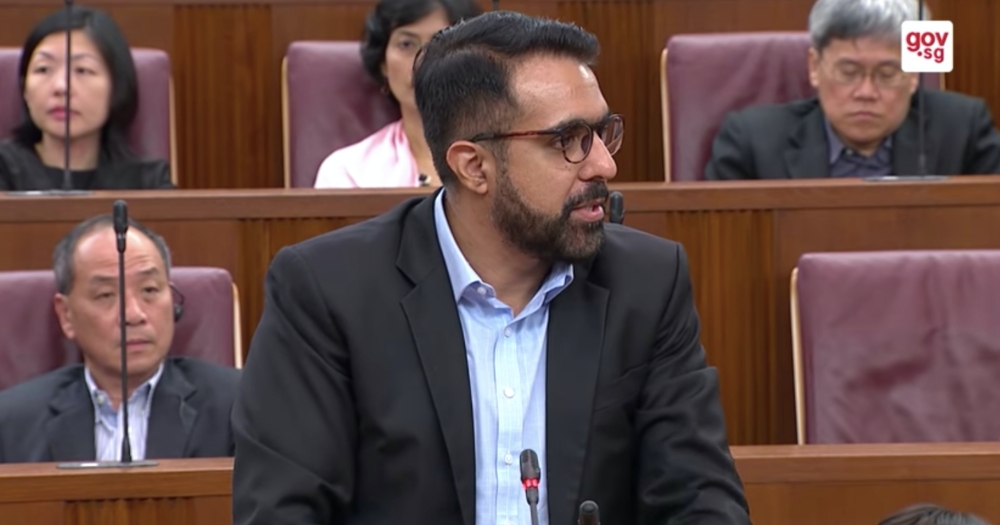The first day of debate on the President's Address started on Monday, Aug. 31.
President Halimah Yacob had opened Singapore's 14th Parliament on Aug. 24, when she outlined priorities for the government as it tackles the Covid-19 pandemic.
Workers' Party chief Pritam Singh was the first opposition Member of Parliament (MP) to speak in the debate, giving his maiden speech as the Leader of the Opposition (LO).
LO duties and privileges formally recognised in Parliament
Singh's duties and privileges as the LO were formally recognised earlier today (Aug. 31) in Parliament by Leader of the House Indranee Rajah.
Indranee reiterated that Singh will be given an office in Parliament, staff support, resources, and additional allowance, all of which had been announced last month by the offices of the Speaker of Parliament and the Leader of the House.
Singh was seated directly opposite Prime Minister Lee Hsien Loong in the chamber and the House later passed a motion to double his speaking time from 20 minutes to 40 minutes, equivalent to that given to political officeholders.
Singh reveals more details on LO's roles and privileges
In his speech, Singh began by saying that the announcement of the LO position came as a surprise to WP, and added that WP will set its "own standards and chart an independent course".
It is also an opportunity for politicians to educate themselves and better understand what it means to be a check and balance on the government, he said.
Resources given
He also shared his understanding of the resources that will be given to him as the LO.
"This is important for the public to know in formulating their expectations," he explained.
Every elected member of parliament is given a budget to hire a legislative assistant and secretarial assistant.
The legislative assistant is paid an allowance of S$1,300 per month and the secretarial assistant is paid an allowance of S$500 a month, meaning that these are part-time positions.
For the Office of the Leader of the Opposition, the government has allocated a budget for three more legislative assistants, each of whom will be paid S$1,300, a month. These positions are "part-time" ones, "based on these sums".
Singh added:
"By contrast, it is useful to remember that a sitting government has it has at its disposal the resources of the Singapore Public Service, a very good one I might add, of 146,000 full-time officers. Of these, 85,000 are members of the civil service.
The LO’s office, the Leader of the Opposition’s office, will not have the breadth and depth of the party in government in coming up with alternative policies. Nonetheless, the Workers' Party will continue pursuing alternatives we feel are important for Singapore. An example being the proposal for redundancy insurance for workers as put forth in the last term of Parliament."
Each PAP MPs who are not political office holders are also given only one legislative assistant and one secretarial assistant.
But they have the additional resources of the People’s Association (PA), including the staff at community clubs for their grassroots work, Singh explained.
In contrast, neither Non-Constituency Members of Parliament (NCMPs) nor Nominated Members of Parliament (NMPs) are given these resources.
Relationship with PSP NCMPs
There are two NCMPs in the 14th Parliament: Progress Singapore Party (PSP)'s Leong Mun Wai and Hazel Poa.
In other Westminster parliaments, the LO is not considered the leader of all opposition parties in Parliament.
This will also be similar in Singapore, clarified Singh.
He said:
"The Progress Singapore Party has its own principles and ideology that are distinct from the Workers’ Party. Mr Leong and Ms Poa may propose policies and promote ideas very different from, and even in disagreement to those from the Workers’ Party. It is possible that they may support government policies that we disagree with, or vice versa.
However, where our position positions match and are in the best interest of Singapore, I look forward to collaborating with PSP NCMPs. Taken together. This would make for healthy debate in this house, where policies are debated on their merits and principles, rather than in support or opposition to the government."
Organising WP MPs into five areas
Singh also explained that it is not feasible for WP to set up a Shadow Cabinet in the tradition of Westminster parliaments as there are only 10 WP MPs.
There are 16 ministries in Singapore which have the resources of 37 political office holders from Parliamentary Secretary upwards. Of these 37, 20 are full ministers.
Despite not being able to shadow each ministry, Singh said that WP intends to organise its MPs to look into five areas that are "critical for Singapore and of huge importance to Singaporeans".
These five areas are:
- Health, aging and retirement adequacy
- Jobs, businesses and the economy
- Education, inequality and the cost of living
- Housing, transport and infrastructure
- National sustainability
Related story
Totally unrelated but follow and listen to our podcast here:
Top image from gov.sg/YouTube.
If you like what you read, follow us on Facebook, Instagram, Twitter and Telegram to get the latest updates.
